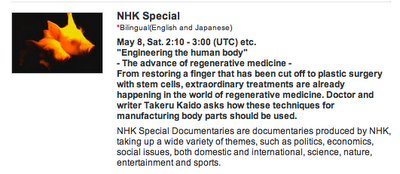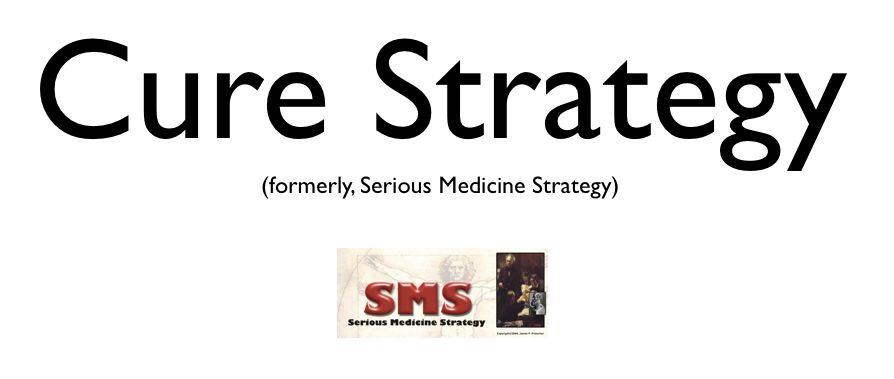
This morning I watched a fascinating documentary on NHK TV, reporting on Japanese efforts to advance stem cell research. And yet interestingly, much of the research is being done--and many of the benefits are being seen--here in the US.
The picture above, screen-grabbed from the NHK documentary, shows piglets genetically altered with fluorescent protein; many more such pics can be seen here. Such bio-bravura might seem like mere showmanship, and no doubt there's some of that, but the science of xenotransplantation is, indeed, advancing rapidly.
And that's not the half of it. The NHK documentary reported on a Cincinnati, Ohio man, Lee Spievack, who lost the tip of his finger in a hobby-shop accident five years ago. Yet his finger has reportedly been regenerated, complete with fingernail, by dropping "pixie dust" on the stub of his finger. The pixie dust, of course, is just a nickname for serious material, extracellular matrix, or ECM, derived from pig bladders, which is believed to help stoke the regrowth of tissue. It must be added that some say that the incident was a hoax, because Spievack's wound wasn't that severe.
Yet the Pentagon is extremely interested, as a way of restoring America's wounded warriors to full, or at least better, health. The NHK documentary featured on-air interviews with doctors, and wounded soldiers, expressing optimism that the ECM was helping at least a little, regrowing war-blasted muscle and even the beginnings of a blown-off finger.
So is "pixie dust"/ECM just the latest version of cold fusion? Or is it the beginning of something big? Suffice it to say, the scientific debate, and the inquiry, will continue.
Perhaps what's most interesting is how little coverage such debates seem to have lost their grip on the American imagination. Obviously other issues are important, too, but it's hard to think of any other issue more important than biotech. Not only because it concerns all of our lives, but because biotech also represents nascent industries, waiting to be born--the question is where. Japan? The US? Singapore? China? Right now, it's hard to know.
Whichever country takes the lead in biotech will likely take the lead, period, in the century to come. Although, of course, if the history of computer technology is any guide, the benefits of biotech will likely spread far and wide around the world. Japan excelled in consumer electronics, going back half a century, but it was the whole world that benefited. And the same is true, more recently, for US computer and Internet technology.
Stem cell has been extremely controversial in the US. Back in the summer of 2001, before 9-11, it seemed as though stem cells were the most vexatious issue in America. President George W. Bush reached a reasonable enough compromise, although, of course, he was not the only decisionmaker--stem cell is a worldwide phenomenon. In any case, by now, nearly a decade later, the science of stem cell has moved way beyond embryonic stem cells, to stem cells derived from all manner of adult organs, and so while there's much reason to be queasy about some of what is happening, or might be happening, the "cat is out of the bag," worldwide.
Science does what it does, a sort of permanent revolution, a point made brilliantly decades ago by Harvard's I. Bernard Cohen in his book Revolution in Science.
More recently, a different facet of the same inevitable reality was illuminated by by Steven Levy, in a fascinating Wired magazine assessment of geek/hacker culture, 25 years after he published a pathbreaking book on the subject. Then and now, Levy celebrates the techno-enthusiasm of geek/hacker culture, the sense of doing something just because you can.
Catching up with Bill Gates, among others, now grown relatively old, Levy noted changes in Gates' thinking. If he were 13 again, Gates said, he would go into biology, not computers:
Just ask Bill Gates. If he were a teenager today, he says, he’d be hacking biology. “Creating artificial life with DNA synthesis. That’s sort of the equivalent of machine-language programming,” says Gates, whose work for the Bill & Melinda Gates Foundation has led him to develop his own expertise in disease and immunology. “If you want to change the world in some big way, that’s where you should start — biological molecules.” Which is why the hacker spirit will endure, he says, even in an era when computers are so ubiquitous and easy to control. “There are more opportunities now,” he says. “But they’re different opportunities. They need the same type of crazy fanaticism of youthful genius and naivetè that drove the PC industry — and can have the same impact on the human condition.”
In other words, hackers will be the heroes of the next revolution, too.
Yes, there are huge moral issues at play here--in biology far more than electronics--and those issues can't and shouldn't be dismissed, because nobody wants sci-fi dystopia. But we do want cures for disease and disability.
And so the reality is that we are charging ahead, here in the US, in Japan, and around the world.


Yes Jim, our brave new world is here and it is no oxymoron. I believe xenotransplantation/ECM coupled with nanotechnology may even make cold fusion a possibility.
ReplyDeleteIt makes me want live forever to see where the human race will evolve to as did the referenced gentlemen below also wondered.
Between Thomas Aquinas
(see: http://plato.stanford.edu/entries/aquinas/#BodSou)
and Pierre Teilhard de Chardin
("In the Phenomenon of Man, de-Chardin has effected a three-fold synthesis - of the material and physical world with the world of mind and spirit; of the past with the future ; and of variety with unity, the many with the one. ...he is able to envisage the whole of knowable reality not as a static mechanism but as a process." Sir Julian Huxley).
has anyone ever tried this for atypical trigeminal neuralgia?
ReplyDelete